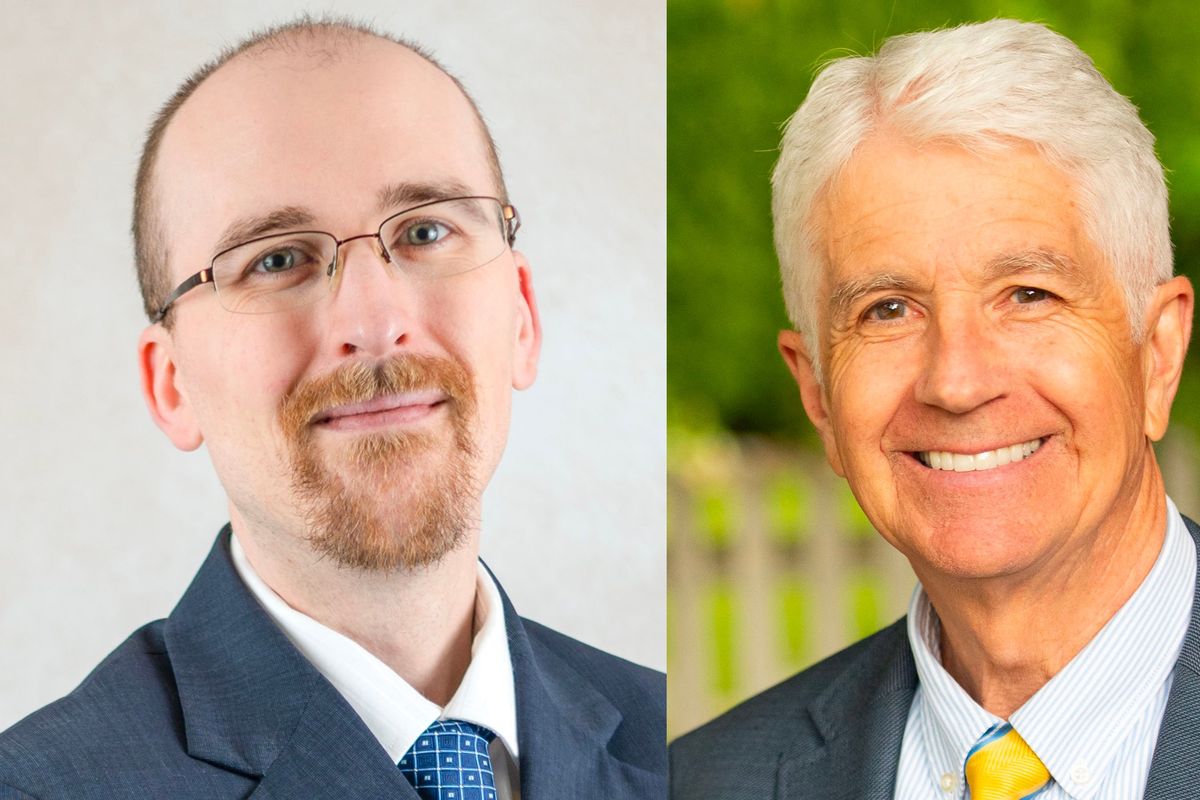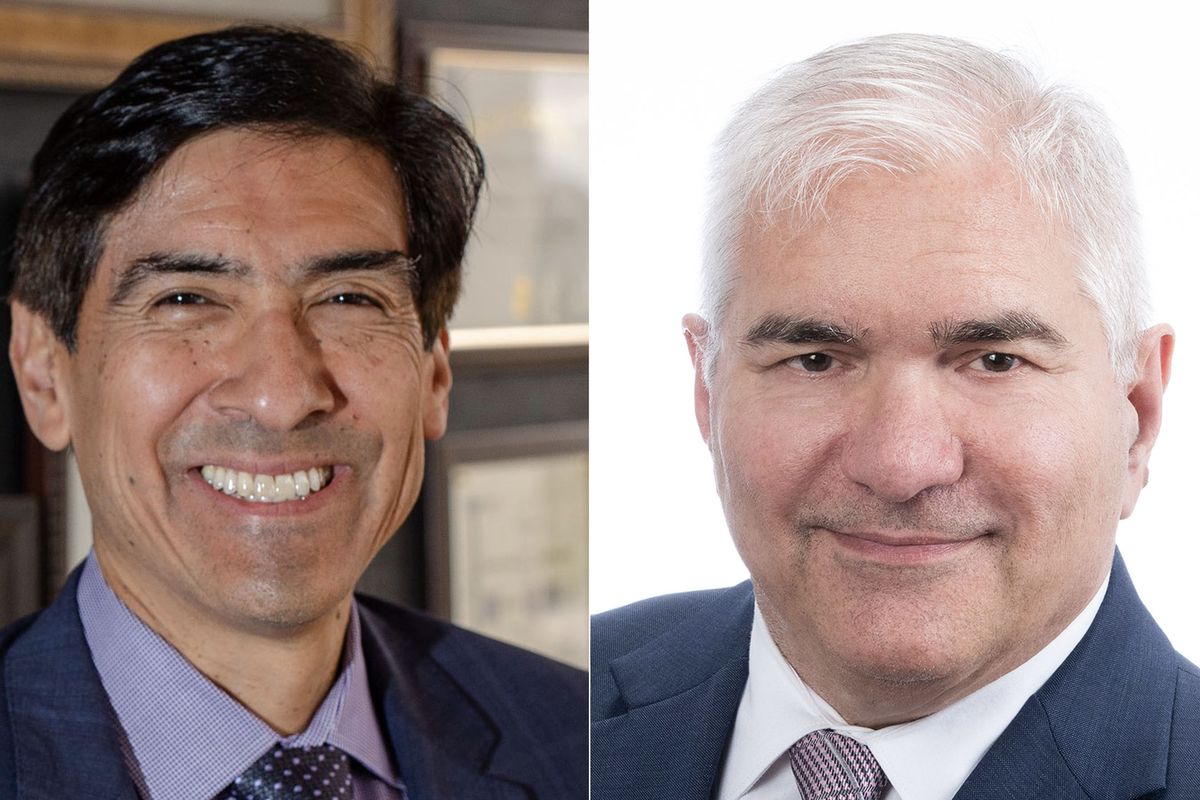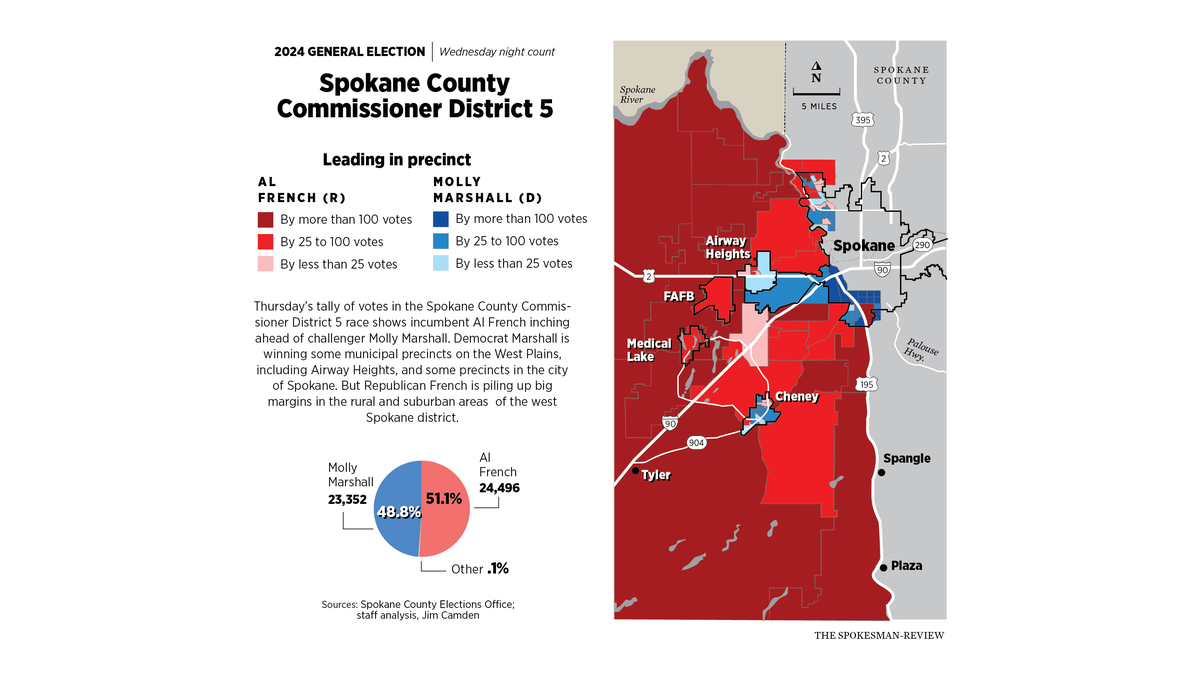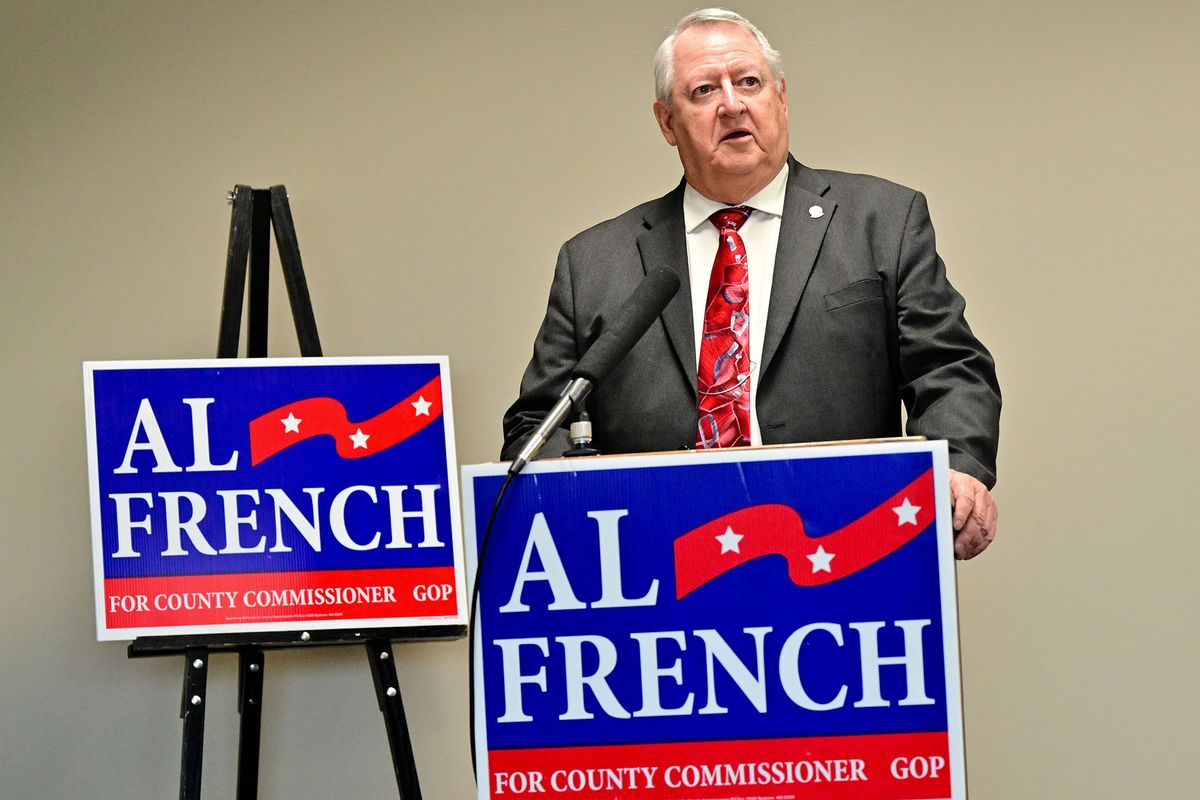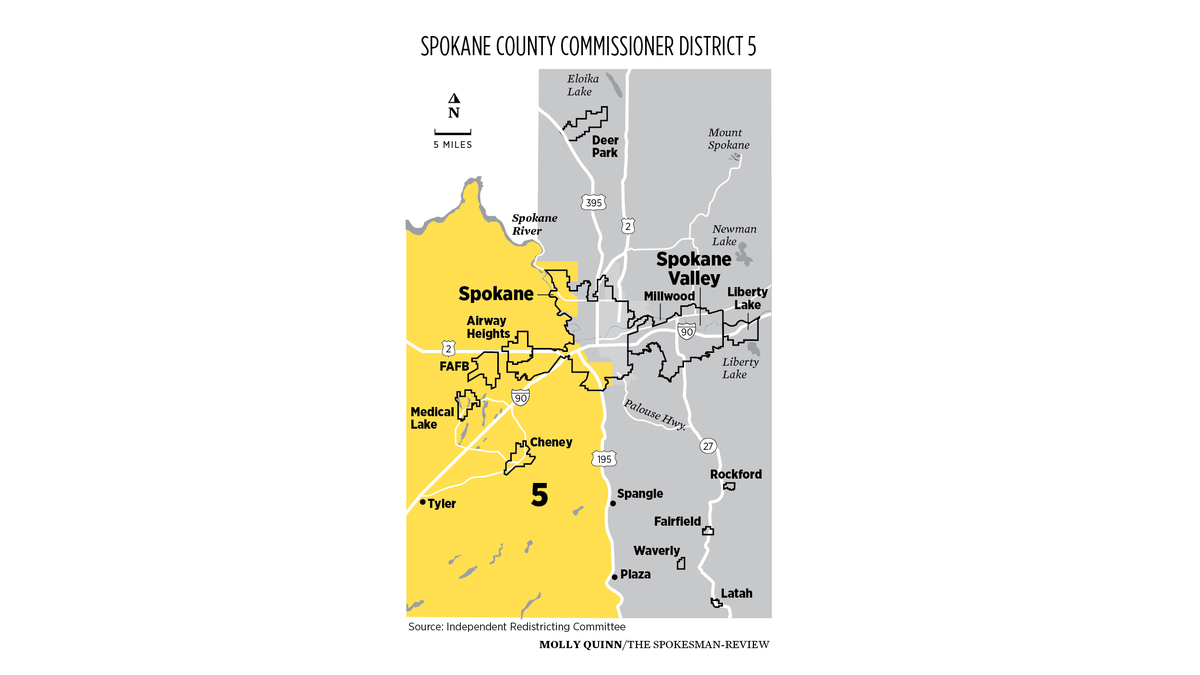Incumbent French grows early lead in Spokane County Commissioner race, many local and statewide races still too close to call after second tally
(Molly Quinn/The Spokesman-Review)
A number of races and ballot measures, ranging from Washington’s highest court to public schools in Cheney, remained too close to call Wednesday.
Of the contests yet to be determined, one anticipated among Spokane County residents is the matchup between incumbent County Commissioner Al French and neighborhood advocate Molly Marshall, a Democrat and Air National Guard retiree.
French, a Republican, holds a 1,144-vote lead over Marshall after the second day of ballot counting, according to the Spokane County Elections Office. French had received 51.1% of the vote to Marshall’s 48.7% as of Wednesday evening.
“As there are fewer ballots left to count, that makes the percentage higher in terms of what she has to get to be able to catch me,” French said. “So we’re feeling pretty darn good.”
The Spokane County Elections Office estimates there are around 40,000 Spokane County ballots left to be counted ahead of the Nov. 26 certification deadline.
If French is re-elected, the conservative architect-by-trade will have served in public office for more than 25 years by the end of the four-year term. French, 73, was first elected to represent the district in 2010, after previously serving two terms on the Spokane City Council.
French said he was encouraged by the support he’s received in the district, which covers the West Plains, northwest Spokane and the South Hill above 29th Avenue.
Based on Tuesday’s initial count, French outperformed Marshall in the district’s rural areas, while more populated precincts, like those in Cheney, Airway Heights or on the South Hill, supported the former Air National Guard member. He attributes the strong support in rural areas to his years advocating for the local agricultural community.
“I understand that industry, and I really work hard to protect it and support it,” French said.
Marshall did not return a request for comment Wednesday evening, but told supporters at a watch party Tuesday that her campaign will help voters cure any outstanding ballots in the district not accepted by the elections office.
“We knew it was going to be close,” Marshall told the crowd after the initial results dropped Tuesday. “I have hope.”
Cheney Public Schools Proposition 1
Cheney Public Schools’ bond was on the precipice of passing after the initial count Tuesday, with 59.2% of votes in favor, according to the elections office. Under Washington law, bonds require 60% to pass.
The measure seems on track for approval after the second tally, jumping to a 60% approval rating as of Wednesday evening.
The $72 million bond would secure funding for a laundry list of projects in the district, which encompasses Cheney, the West Plains and Airway Heights. On top of planned improvements to kitchens, bus loops and athletic facilities for schools around the district, the bond would also fund efforts to plan for growing enrollment.
Cheney Public Schools serves 5,700 students across what is the largest geographical school district in the county, but that figure is expected to grow significantly in the years to come.
To accommodate that growth, the district hopes to use the bond to pay for a new elementary school in Airway Heights, one of the fastest-growing communities in Washington, and swaths of land to build additional schools and facilities in the future.
Spokane County Superior Court Position 11
A senior staff attorney at the Washington State Court of Appeals is in position to join the bench of the Spokane County Superior Court if initial election results hold.
Andrew Van Winkle extended his lead over incumbent Judge Timothy Fennessy Wednesday, drawing 51.8% of votes counted . Van Winkle led with 51.5% of the vote after the first tally Tuesday.
Fennessy, who’s held the position for eight years, faced criticism during his campaign over his demeanor on the bench, and from prosecutors over his handling of sex crime cases. Since 2019, attorneys have filed more than 450 motions to prevent Fennessy from hearing their cases, as reported by The Spokesman-Review.
Van Winkle has faced increased scrutiny in recent months after touting an endorsement by the Spokane County Republican Party and attending their primary election watch party despite running for an explicitly nonpartisan position.
The challenger ran on a platform of modernizing the institution and expanding the mental health court, while Fennessy highlighted his experience. Prior to his stint on the bench, Fennessy practiced law as a civil trial lawyer for more than three decades.
Initiative 2066
Of the four statewide initiatives that appeared on the ballot this fall, only one still has a chance of passing.
The margin between “yes” and “no” votes on Initiative 2066, which would enshrine natural gas usage in Washington, remained relatively stagnant day to day. Approval of the measure stood at 51.2% Tuesday, and jumped a tenth of a percentage point as of Wednesday evening.
Sponsored by the Building Industry Association of Washington, the Washington Hospitality Association and the conservative political action committee Let’s Go Washington, the initiative would do away with recent legislation that sought to expedite the transition from natural gas for large combination utilities.
Large combination utilities are defined in the bill as those that provide electricity to more than 800,000 customers and natural gas to more than 500,000 customers. Puget Sound Energy, the state’s largest utility, is the only one in the state with enough customers to fit the definition.
Ahead of Election Day, proponents argued the measure would protect a customer’s right to choose the energy source right for them, and address rising construction costs they say are caused by recent changes to the state’s energy code that heavily incentivize the use of electrical appliances like heat pumps.
Those against the measure have stressed its approval could greatly hamper the ability to meet and plan for the state’s climate change pledges. The coalition on the opposing side includes more than 200 elected representatives, advocacy groups and businesses like the League of Women Voters of Washington, the American Lung Association and Fuse Washington, according to the NO on I-2066 campaign.
Caitlin Krenn, climate and clean energy director for Washington Conservation Action, stressed that a number of ballots remain to be counted statewide, and that the group remains hopeful voters rejected the initiative.
“What we really saw with all initiatives was that as voters learned more about them, and time went by, the more voters learned and the less they liked initiatives,” Krenn said. “I think the disadvantage with 2066 is that voters had a lot less time to try to figure out all the impacts of the initiative, and they had to do that through a lot of misinformation that was deliberately being pushed by the ‘yes’ campaign.”
While her organization and their peers are focused on how the race will conclude, Krenn said they believe the measure is unconstitutional and have considered challenging it in court if it passes.
“We’re exploring options there,” Krenn said.
Washington Supreme Court Justice Position 2
Longtime Seattle attorney Salvador “Sal” Mungia and Federal Way Municipal Court Judge Dave Larson remain locked in a tight contest, with less than 5,000 votes statewide separating the candidates.
Mungia had received 49.84% of the vote to Larson’s 49.66% as of Wednesday evening, according to the Secretary of State’s Office. Write-in candidates have received just over 12,000 votes, or roughly 0.5%.
Larson had gained 49.8% of Washington’s vote and pulled out to an early lead Tuesday before Mungia made up a roughly 1,000-vote deficit in the second tally.
As a municipal judge since 2009, Larson normally handles contract disputes, traffic violations, occasional drug charges, minor theft and more. He unsuccessfully ran for a Supreme Court position in 2016 and 2020.
While lacking judicial experience, Mungia has worked in medical malpractice, serious injury, personal injury, real estate, business and general litigation at the law firm Gordon Thomas Honeywell since 1986. He was named a partner at the firm in 1991, and has argued a number of cases before the court to which he hopes to be elected.
The race is likely to shift again in the coming days, with more than 778,000 ballots left to be counted statewide, as estimated by the Secretary of State’s Office Wednesday.
Virginia Carr contributed to this report.
